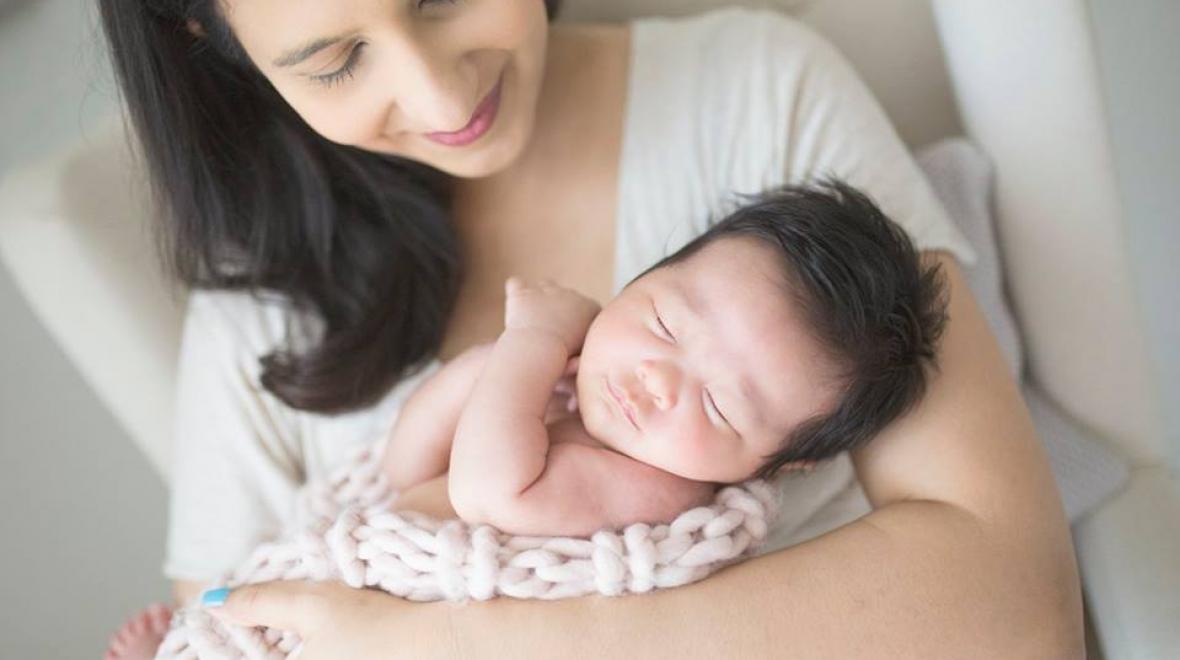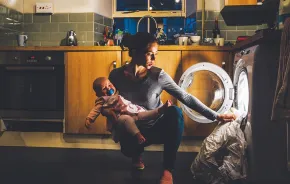
Photo:
Roshni Mahtani, CEO and founder of Tickled Media, with her daughter. Photo credit: BambooShoots Photography
I remember the first time I read “Bringing Up Bebe,” the seminal book on French parenting. I wasn’t even trying to be a parent yet, but after reading the glowing reviews, I saw what the fuss was about.
I was particularly intrigued by a style of parenting that seemed to put parents and their needs before those of their children. All over Asia — where I grew up — making large sacrifices for your children seemed to be the only way to parent.
Since I became a mom in 2016, I’ve only become more interested in parenting styles from around the world. I’ve read about the positive way Germans and Scandinavians raise their kids, about “attachment” and “helicopter” parenting.
Noticeably absent: how parents from Asian nations raise their children. Apart from “tiger parenting,” which seems to teeter on the extreme, I found myself at a loss when seeking parenting styles that reflect my beliefs and upbringing.
So I went back to the source: my home country of Singapore. There I spoke with Roshni Mahtani, CEO and founder of Tickled Media, which reaches 11 million parents across Asia. Here’s what she had to say about how, using a combination of Eastern and Western philosophies, many millennial Singaporean parents raise the children CNN has called “the smartest kids in the world.”
How do you characterize the “Singaporean” style of parenting?
We see from the conversations going on in ParentTown that Singaporean parents can be a bit “kancheong” when it comes to their children. Translating that word [from Cantonese, but used widely by Singaporeans of all backgrounds] doesn’t quite seem to do it justice, but it’s a mix of being anxious and high-strung with a dash of crazy. It’s closely related to being “kiasu,” [a Hokkien word, but also well-used in Singaporean vernacular] which means “afraid to lose.”
Singaporean parents want to make sure that their children always have the best — whether it's education, values, exposure to the world and all other aspects of growing and learning. Enrichment classes, brain food supplements, extreme competitiveness to get one’s child into top preschools — the quest to be the best begins early on.
Are you referring to "tiger mom" parenting?
There has been a shift from the "tiger mums" of previous generations to millennial "kangaroo mums."
A "kangaroo mum"? What’s that?
It’s a concept loosely adapted from kangaroo care (of preterm infants), of which two of the main features are skin-to-skin contact and exclusive breastfeeding. In contrast to the coldness of incubators, this method promotes the bonding of mother and child, allowing them to heal together.
Being a kangaroo mom connotes being warm and nurturing, not just for the sake of the moment, but also for long-term benefits and goals. It’s not the same as coddling, which is motivated by fear of what may happen to the child if the parent isn’t there to intervene. Kangaroo mums are supportive and enabling, without being stifling.
A recent survey among [millennial moms at the CHOmum Conference] showed that they view themselves as ‘enabling’ vs. their own ‘protective’ mums.
How is the "kangaroo mum" style of parenting different from others?
Tiger mums value discipline and excellence, demanding straight As and enrolling their children into every enrichment class. Helicopter parents want control — constantly hovering so they can monitor progress. Laissez faire mums see independence as the key to future success so they let their children make discoveries and mistakes freely. Kangaroo mums seek to strike a balance: between IQ and EQ development, ‘being there’ and letting kids mature on their own, etc.
Mind you, all these categories of parents exist everywhere in the world. The differences between Western and Eastern styles of parenting lie in culture and tradition. For example, Asian children leave the nest later than their Western counterparts, which is the chicken-and-egg explanation of laissez faire mums valuing their children’s independence.
Can you give me an example of being a kangaroo mum in Singapore?
The annual PSLE (Primary School Leaving Examination) national testing, which at a relatively early stage in a student’s life can alter the course of their professional future. Because of the nature and consequences of the exam, many Singaporean mums take months, even up to a year, off work to tutor their kids.
It may seem like a tiger mum move, but at its core is actually very kangaroo. It’s their concern for their children’s welfare moving them to put their own careers on pause. They want to be there for and with their kids during this high pressure time in both their lives.
What other traits should our readers look for in kangaroo parenting?
Physically, babywearing is very kangaroo; you’re keeping the baby close as you go about your day. It's not just convenient, but has also been shown to have a lot of developmental benefits for the child. It's as close as you'll get to letting them see the world through your eyes.
Breastfeeding is one of the main characteristics of kangaroo care and I needn't look far for examples. Just at our office, so many of our mom employees devote so much time and effort to it. They'd of course prefer to be with their babies and feed directly, but this is the working mum's way of nurturing her child to the best of her abilities.
Those with older babies prefer to prepare homemade instead of store-bought meals for their tots, so they know what’s going into the food and that they’re receiving the best nutrition possible.
How has this influenced how you parent your child?
Despite having crazy schedules (both my husband and I are entrepreneurs) we’ve insisted on [sharing a bed] with our daughter. There are days when I want to give it up like when she’s sick [or when she] wakes up throughout the night, leaving us thoroughly exhausted. But those quiet moments when we just get to stare at her peacefully dreaming make all the trouble worth it.
Having founded a company that primarily speaks to mums and dads, I made it a point to make our office truly parent-friendly. One of the features is a playroom, so mums and dads can bring their kids to work when they have to. I think my daughter, who’s not even 2, has been to more meetings than playdates. Twice the entrepreneur gene plus early exposure may just mean we have a tiny female founder on our hands!
We also travel a lot (mostly for work) and bring her along when we can, or really try to squeeze in family trips. We recently took a toddler-friendly trip to Osaka, and though we needed a vacation from our vacation, we had an awesome time.











